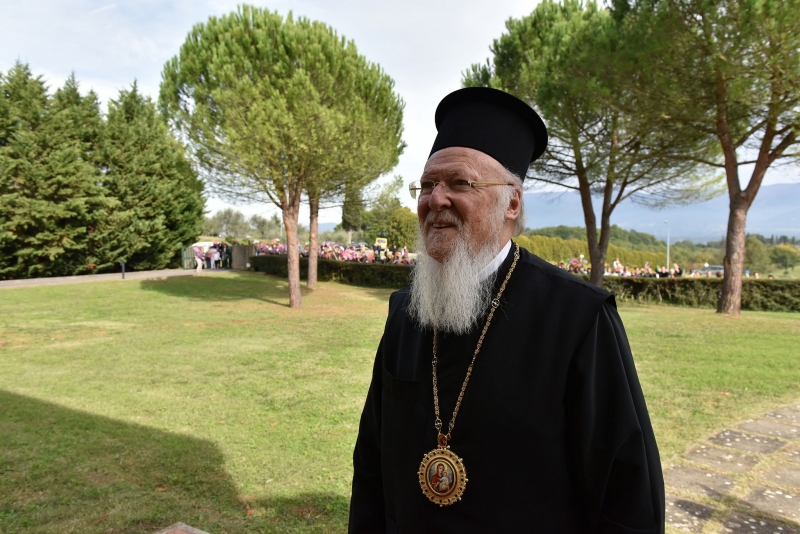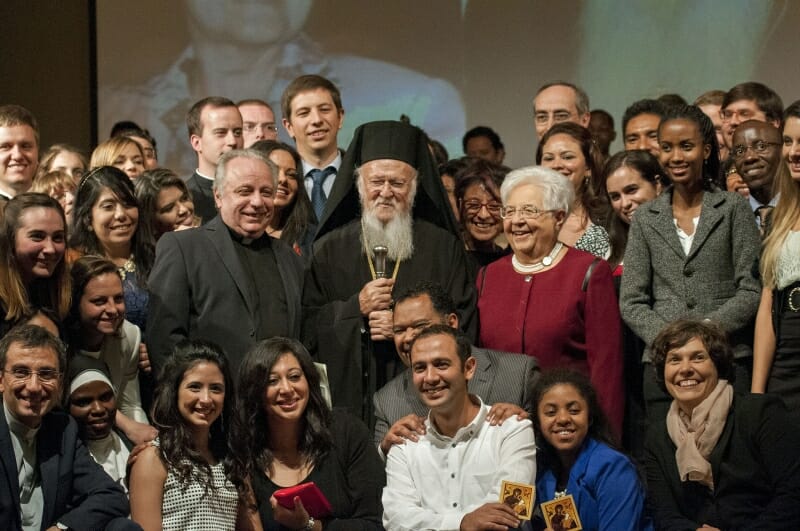

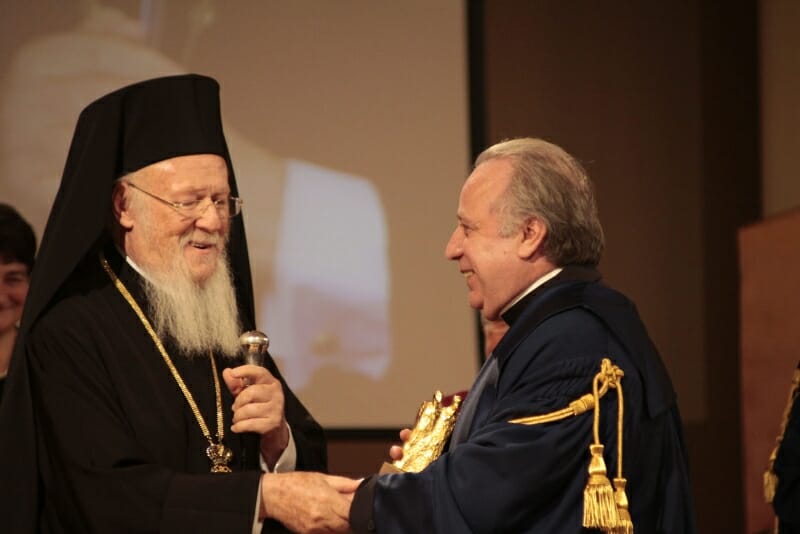
Piero Coda: the new words of the Patriarch
Patriarch Bartholomew I has pursued the history of an ecumenical journey, what in your opinion is the novelty of his achievements? “There are substantially two new aspects: firstly, the testimony of fraternity between Pope Francis and Patriarch Bartholomew. The message which the Holy Father sent to Bartholomew touched the Patriarch in a particular way, and he answered with the invocation of the prayer multos annos for Pope Francis, so as to take a further step towards unity. And the second novelty which struck me is “unity in diversity,” which besides other things is a leitmotif of many of Pope Francis’s discourses that underline how the Gospel is not uniformity but upholding the differences. They stand for unity precisely inasmuch as they spring from a sole source. They relate to one another and are able to reciprocally discover the gifts each of them conveys, due to which diversity is the gem of unity, especially when it is lived in relationship, that is, in fraternity and communion. To my mind these are two strong and new messages, that echo in a particularly effective manner, and are underlined by the way they touched the hearts of the great crowd present – 1,400 people – who responded to the fundamental parts of their speeches with intense rounds of applause that really came from the heart.” In a world that raises barriers in the name of diversity and the refusal of the other, what responsibility do Christians have today? “A unique responsibility, since in reality, only Jesus brought into the history of mankind a model of unity that is able to hold differences together and that is able to make it valuable. No other human vision or human ideology has ever been able to bind unity and diversity as one. It either ended up in uniformity or anarchy. Jesus has shown us the way which is narrow, difficult and in the end, also entails a taking up of the cross. But it leads to the resurrection and transfiguration of the differences into unity. This is the pearl of the Gospel, unity in diversity, communion, and the Holy Trinity incarnated in the relationships with all, starting from the poor and the derelicts, as the Pope reminds everyone.” Your continual reference to the Trinity to see what direction should be followed to achieve unity in diversity, strongly resembles the charism of Chiara Lubich and her vision of the “Trinitarian relationships” as the paradigm to be followed… “The Sophia University Institute was the fruit of Chiara Lubich’s inspiration, when she understood that the time had come for the charism, given to her by God and which had established the Focolare Movement, to become also a cultural expression. There is always need for mediations, paradigms – as Pope Francis says, a cultural revolution – so as to channel existence towards new frontiers. This is why Sophia University Institute was born: a new and tiny reality which is aware of all the limits of its initial stages and of human forces, but which is experiencing also the greatness of God’s Spirit, the charism of unity –the ut unum sint which is the key of our time. That is why our effort is to culturally draw forth with prophetic vision, concreteness, and realism, the significance of this paradigm of unity in diversity in politics (the politics of fraternity), and in economics (the Economy of Communion), at the level of philosophy (respect for the other), in all fields. I see the importance of such a deep harmony between what Pope Francis says (the mysticism of all as one, a Church that breaks its confines), and what Patriarch Bartolomew says (unity in diversity), the charism of unity given to our time … so as to make the journey together. The Holy Spirit is an artist, and infinitely disseminates gifts of all sorts but aims at one very precise project: today it may consist in the healing of these conflicts and gaps that divide humanity, to allow all the positive aspects existing to germinate, and infinite things already exist. So it has to be a laboratory of hope.” Source: interview with various newspapers, after the conferment of the Doctorate to the Ecumenical Patriarch of Constantinople, Bartholomew I.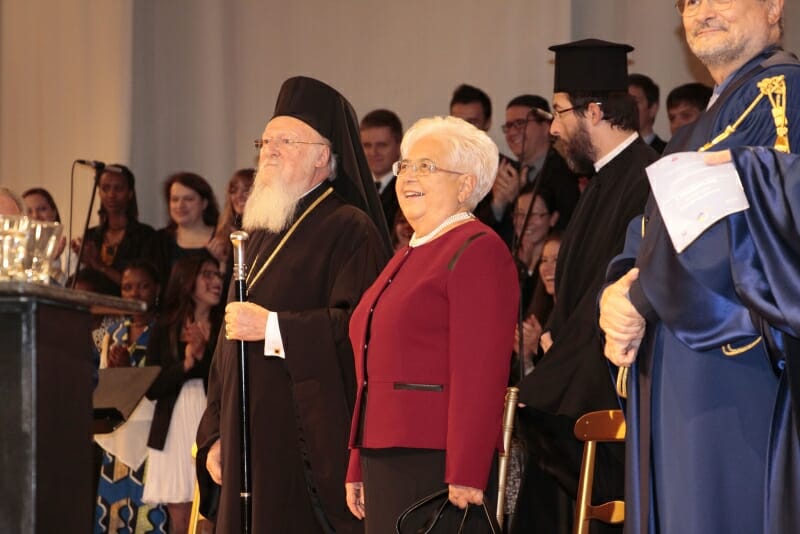
Bartholomew I and his passion for unity
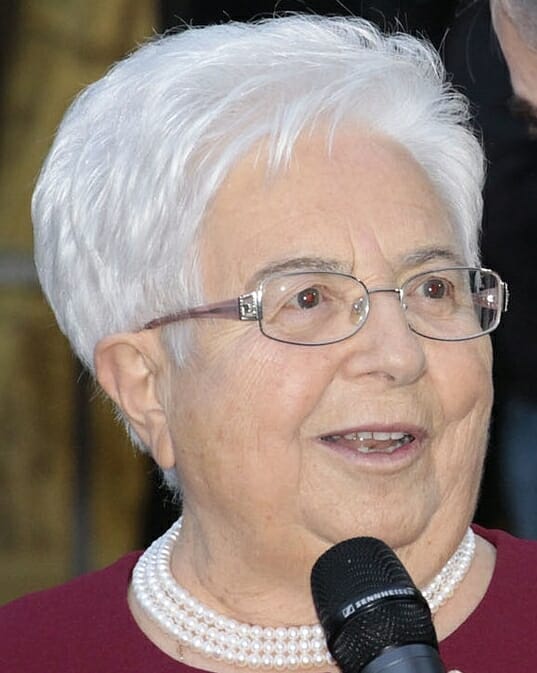 “Everyone was so touched by the brotherly affection that joins the Holy Father Francesco to His Holiness Patriarch Bartholomew. The Pope recognizes the Patriarch’s commitment in the journey of unity, which he describes as our common journey. Not only that: he very courageously says that this Honorary Degree is a step ahead in that journey.” You know the Patriarch very well, you have lived and now live even more intensely, this moment in a long history of closeness between the Focolare Movement and the Orthodox Church and its Patriarchs. What are your views on this Patriarch and the significance of this recognition? “Patriarch Bartholomew is the heir of the great Patriarch Athenagoras who really possessed this passion for unity which, in him, was almost a prophetic vision that he was not able to realize. This passion was transmitted particularly to Patriarch Bartholomew who never misses an opportunity to press for unity in the heart of the Orthodox Church, so that they can talk to one another to the Church of Rome with a voice that is already in a certain sense synodal. He tries in many ways to emphasise how much this journey together is alive. I think we are truly at a happy moment because there is gentle pressure being given by two heads of our two Churches, and that cannot but produce fruit. There will be resistance as Pope Francis pointed out at the conclusion of the Synod, but in the end there is the Holy Spirit who will help us, who pushes the Church securely towards the unity of the Churches. We think that this is a happy moment and that this recognition might be an important step, a concrete step on this journey.”
“Everyone was so touched by the brotherly affection that joins the Holy Father Francesco to His Holiness Patriarch Bartholomew. The Pope recognizes the Patriarch’s commitment in the journey of unity, which he describes as our common journey. Not only that: he very courageously says that this Honorary Degree is a step ahead in that journey.” You know the Patriarch very well, you have lived and now live even more intensely, this moment in a long history of closeness between the Focolare Movement and the Orthodox Church and its Patriarchs. What are your views on this Patriarch and the significance of this recognition? “Patriarch Bartholomew is the heir of the great Patriarch Athenagoras who really possessed this passion for unity which, in him, was almost a prophetic vision that he was not able to realize. This passion was transmitted particularly to Patriarch Bartholomew who never misses an opportunity to press for unity in the heart of the Orthodox Church, so that they can talk to one another to the Church of Rome with a voice that is already in a certain sense synodal. He tries in many ways to emphasise how much this journey together is alive. I think we are truly at a happy moment because there is gentle pressure being given by two heads of our two Churches, and that cannot but produce fruit. There will be resistance as Pope Francis pointed out at the conclusion of the Synod, but in the end there is the Holy Spirit who will help us, who pushes the Church securely towards the unity of the Churches. We think that this is a happy moment and that this recognition might be an important step, a concrete step on this journey.”  In his speech the Patriarch spoke precisely about what unity is and that it is different from union, which is different from uniqueness – diversity as richness, a concept that is quite present in the charism lived by Chiara Lubich. Could you explain to us a little more, in what way? “Chiara was always reminding us that the Church’s journey is guided by the Holy Spirit, and therefore He was surely maturing gifts in all the Churches of Christianity that would serve unity, that would serve if they were put in common. These gifts do not flatten but respect the diversity, precisely because they recognize a great richness in these diversities that only makes the Church more beautiful as Jesus wanted it. No uniformity therefore, but unity in diversity. Chiara would tell us that the highest model is the unity that joins the Most Holy Trinity where the Father is Himself because He is not the Son; the Son is Himself because He is not the Father; but the love that there is between the Father and the Son generates none other than the Holy Spirit who is the Third in this Trinitarian dimension, but is also the First since He links the Father and the Son. And this can happen because each of the Three Divine Persons of the Most Holy Trinity completely loses Himself in the other. This is precisely what is required for the Church’s journey; that is, that each one be able to completely lose himself in the other church; which means being able to reach all the way down to the bottom of one’s own richness and give it all to the other, to the others. Therefore, it requires knowing how to be love in order to build that Church of Christ in which each Christian, no matter what Christian community they belong to, feels like a sharer in the Body of Christ.” With this award, are there any new prospects that might open? “We were actually talking with the Patriarch himself about the possibility of eventually instituting a Chair at Sophia University Institute that would be part Roman Catholic and part Orthodox and would study such figures as Chiara Lubich and Patriarch Athenagoras, trying to sort out and understand the contribution they made and can continue make, through the encounter of their two charisms, to this journey of unity.” (From Vatican Radio)
In his speech the Patriarch spoke precisely about what unity is and that it is different from union, which is different from uniqueness – diversity as richness, a concept that is quite present in the charism lived by Chiara Lubich. Could you explain to us a little more, in what way? “Chiara was always reminding us that the Church’s journey is guided by the Holy Spirit, and therefore He was surely maturing gifts in all the Churches of Christianity that would serve unity, that would serve if they were put in common. These gifts do not flatten but respect the diversity, precisely because they recognize a great richness in these diversities that only makes the Church more beautiful as Jesus wanted it. No uniformity therefore, but unity in diversity. Chiara would tell us that the highest model is the unity that joins the Most Holy Trinity where the Father is Himself because He is not the Son; the Son is Himself because He is not the Father; but the love that there is between the Father and the Son generates none other than the Holy Spirit who is the Third in this Trinitarian dimension, but is also the First since He links the Father and the Son. And this can happen because each of the Three Divine Persons of the Most Holy Trinity completely loses Himself in the other. This is precisely what is required for the Church’s journey; that is, that each one be able to completely lose himself in the other church; which means being able to reach all the way down to the bottom of one’s own richness and give it all to the other, to the others. Therefore, it requires knowing how to be love in order to build that Church of Christ in which each Christian, no matter what Christian community they belong to, feels like a sharer in the Body of Christ.” With this award, are there any new prospects that might open? “We were actually talking with the Patriarch himself about the possibility of eventually instituting a Chair at Sophia University Institute that would be part Roman Catholic and part Orthodox and would study such figures as Chiara Lubich and Patriarch Athenagoras, trying to sort out and understand the contribution they made and can continue make, through the encounter of their two charisms, to this journey of unity.” (From Vatican Radio)
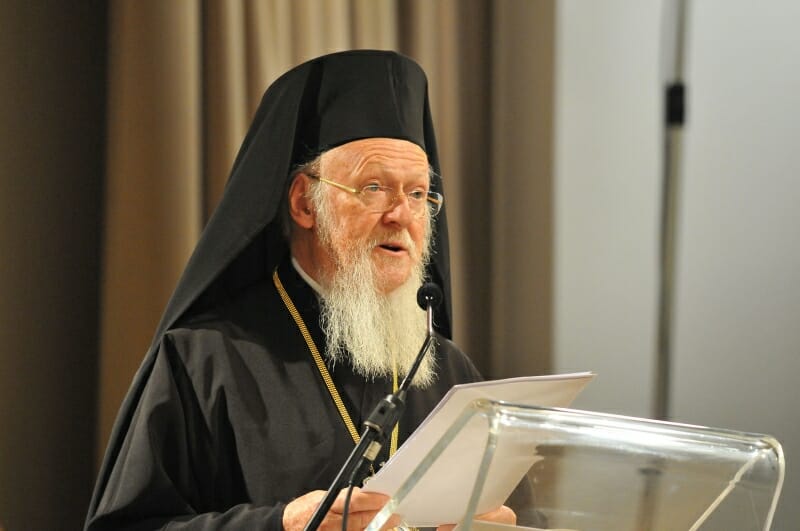
Bartholomew I, master of the Culture of Unity
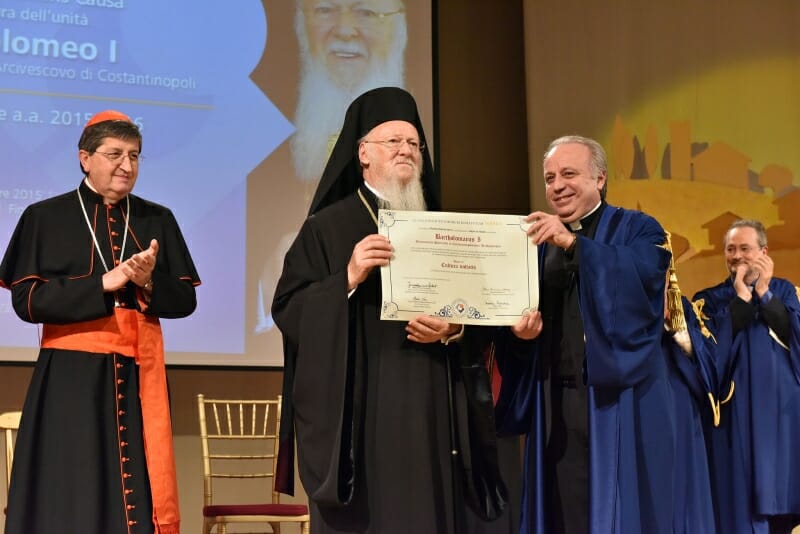 During his lecture on October 26, 2015, following the conferment of the title of Doctor in the “Culture of Unity” by Sophia University Institute, Bartholomew I recalled the history of relations between the two “sister” churches. Those relations had been marred by centuries of misunderstanding and, in time returned to the path towards unity with the lifting of the mutual excommunications and the steps taken by such figures as Paul VI and Athenagoras I whose legacy has been embraced by Bartholomew I. It is a path that has recently recalled the value of “synodality” as a key element in guiding the Church of Christ, and there were several occasions that expressed spiritual synergy. In his message, read by Cardinal Betori, Pope Francis addressed “the beloved brother Bartholomew” stressing “the common journey our Churches take towards full and visible unity, to which we aspire with dedication and perseverance.” The Patriarch was deeply touched by the Pope’s words and said he was “very” happy, confiding that he would “return to Istanbul stronger, more certain” knowing there was a “a brother in Rome who wished to work and pray with us to accelerate the unity of our churches” and to whom he responded with the “Kiss of Peace” invoking the prayer for a long life for Pope Francis.
During his lecture on October 26, 2015, following the conferment of the title of Doctor in the “Culture of Unity” by Sophia University Institute, Bartholomew I recalled the history of relations between the two “sister” churches. Those relations had been marred by centuries of misunderstanding and, in time returned to the path towards unity with the lifting of the mutual excommunications and the steps taken by such figures as Paul VI and Athenagoras I whose legacy has been embraced by Bartholomew I. It is a path that has recently recalled the value of “synodality” as a key element in guiding the Church of Christ, and there were several occasions that expressed spiritual synergy. In his message, read by Cardinal Betori, Pope Francis addressed “the beloved brother Bartholomew” stressing “the common journey our Churches take towards full and visible unity, to which we aspire with dedication and perseverance.” The Patriarch was deeply touched by the Pope’s words and said he was “very” happy, confiding that he would “return to Istanbul stronger, more certain” knowing there was a “a brother in Rome who wished to work and pray with us to accelerate the unity of our churches” and to whom he responded with the “Kiss of Peace” invoking the prayer for a long life for Pope Francis. 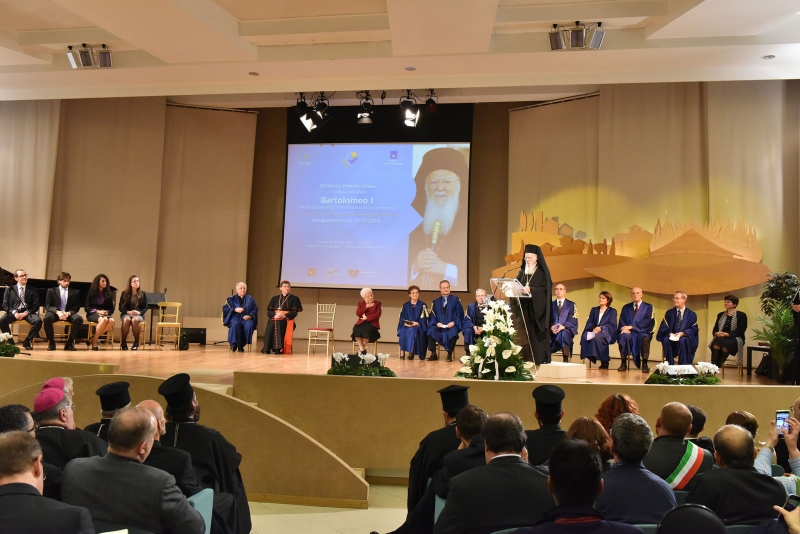 The Patriarch’s words breathed a history that had gone from “the refusal to recognise the other as Christian” to the rise of “protagonists of the new springtime in the Church who would make unity the main focus of their pastoral activity for the good of all” and because of their single desire of “advancing the ways of God.” His words also breathed a future history in which both Church and human institutions would understand that “diversities are a gift and not contrapositions, richness and not imbalance, life and not death” The ceremony was held in the Focolare town of Loppiano, Italy, where Sophia University Institute is located, and that day marked the opening of Sophia’s 8th academic year. More than a thousand people attended the extraordinary event with the presence of His Holiness Bartholomew I – several delegations from the Orthodox Church, representatives of the Roman Catholic Church, civic leaders, a Muslim community and over 4 thousand viewers connected via internet.
The Patriarch’s words breathed a history that had gone from “the refusal to recognise the other as Christian” to the rise of “protagonists of the new springtime in the Church who would make unity the main focus of their pastoral activity for the good of all” and because of their single desire of “advancing the ways of God.” His words also breathed a future history in which both Church and human institutions would understand that “diversities are a gift and not contrapositions, richness and not imbalance, life and not death” The ceremony was held in the Focolare town of Loppiano, Italy, where Sophia University Institute is located, and that day marked the opening of Sophia’s 8th academic year. More than a thousand people attended the extraordinary event with the presence of His Holiness Bartholomew I – several delegations from the Orthodox Church, representatives of the Roman Catholic Church, civic leaders, a Muslim community and over 4 thousand viewers connected via internet.  The recognition statement presented to the Patriarch of Constantinople expressed gratitude “for his courageous, enduring and fruitful patience in favour of a culture of unity” of which he is a “beloved and listened-to protagonist on the international level, on the ecclesial level in the dialogue between the Churches, on the interreligious level in the encounter amongst different religious traditions and experiences, and on the cultural level in the collaboration amongst women and men of all beliefs who follow the path of universal brotherhood.” In an interview, Dr. Piero Coda, President of the Institute, went on to say – explaining the culture of unity – it is not a utopia, but an “inspiration through which Chiara Lubich understood that the charism of unity given to her by God, could also be expressed by culture. There is always a need for mediations, models, as Pope Francis says, a cultural revolution, to channel existence towards new frontiers. This is why Sophia University Institute was begun.” Focolare president, Maria Voce, spoke for the whole Movement expressed to the Patriarch the joy and the honour of welcoming him to the town of Loppiano, mindful of the leading role he plays as a spiritual and intellectual figure, the value of his testimony and of his “calls to justice and the safeguarding of the environment which is our common home.” “Dialogue is our common priority,” Maria Voce continued, as she stated our wish to “pursue the path in total harmony of ideals and life witness.” Another step, recalled by Bartholomew I during an interview at the conclusion of the ceremony, was the November 2015 gathering in Istanbul, of Bishop Friends of the Focolare from different churches: “There,” he said, “we will be able to express our will to work for the unity of our Churches. We are glad and ready to welcome them and to exchange the Kiss of Peace between East and West.” Unity in diversity was one of the “new terms” that were mentioned, and that University president Piero Coda strongly emphasised: “the Gospel is not uniformity, but appreciation of differences. Flowing from the same font, they are ‘unity’ precisely in the measure to which they enter into relation with one another; that is, that they mutually recognize the gifts that each of them carries. Therefore, diversity is the flower of unity when it is lived as a relationship, as fraternity, as communion.” “And it is precisely in the acceptance of the diversity” – the Patriarch concluded – “through the dialogue of love, mutual respect, acceptance of the Other and our availability to welcome and be welcomed, that we will be able to become for the world icons of Christ and like Him, in unity, also be diversity.” Replay streaming Message from Pope Francis Press Release
The recognition statement presented to the Patriarch of Constantinople expressed gratitude “for his courageous, enduring and fruitful patience in favour of a culture of unity” of which he is a “beloved and listened-to protagonist on the international level, on the ecclesial level in the dialogue between the Churches, on the interreligious level in the encounter amongst different religious traditions and experiences, and on the cultural level in the collaboration amongst women and men of all beliefs who follow the path of universal brotherhood.” In an interview, Dr. Piero Coda, President of the Institute, went on to say – explaining the culture of unity – it is not a utopia, but an “inspiration through which Chiara Lubich understood that the charism of unity given to her by God, could also be expressed by culture. There is always a need for mediations, models, as Pope Francis says, a cultural revolution, to channel existence towards new frontiers. This is why Sophia University Institute was begun.” Focolare president, Maria Voce, spoke for the whole Movement expressed to the Patriarch the joy and the honour of welcoming him to the town of Loppiano, mindful of the leading role he plays as a spiritual and intellectual figure, the value of his testimony and of his “calls to justice and the safeguarding of the environment which is our common home.” “Dialogue is our common priority,” Maria Voce continued, as she stated our wish to “pursue the path in total harmony of ideals and life witness.” Another step, recalled by Bartholomew I during an interview at the conclusion of the ceremony, was the November 2015 gathering in Istanbul, of Bishop Friends of the Focolare from different churches: “There,” he said, “we will be able to express our will to work for the unity of our Churches. We are glad and ready to welcome them and to exchange the Kiss of Peace between East and West.” Unity in diversity was one of the “new terms” that were mentioned, and that University president Piero Coda strongly emphasised: “the Gospel is not uniformity, but appreciation of differences. Flowing from the same font, they are ‘unity’ precisely in the measure to which they enter into relation with one another; that is, that they mutually recognize the gifts that each of them carries. Therefore, diversity is the flower of unity when it is lived as a relationship, as fraternity, as communion.” “And it is precisely in the acceptance of the diversity” – the Patriarch concluded – “through the dialogue of love, mutual respect, acceptance of the Other and our availability to welcome and be welcomed, that we will be able to become for the world icons of Christ and like Him, in unity, also be diversity.” Replay streaming Message from Pope Francis Press Release
Trade unionists for universal brotherhood
 Their “ethical statute” defines them as people who are immersed in «the contradictions and difficulties of the present time, and who take on themselves the burdens and sufferings of the world of work …in the perspective of universal brotherhood.» In this tension one can see the signs of that essential “new school of thought” indicated by Pasquale Foresi (“life itself makes us comprehend”), co-founder of the Focolare Movement who affirmed: «work is not only a means of sustainment, but is something inherent to our human nature, and is thus also a means to get to know reality and understand life. » It was a working method revealed through the experience of the employees of the former CGlobal company of Pisa involved in one of the usual restructuring and delocalization of businesses, and the story of the “bonds of solidarity” trade union fund of Pomigliano d’Arco, Naples, created thanks to the Parish of San Felice in Pincis, to give mutual aid to a community on the verge of collapse due to the lack of jobs caused by the international division of work steered by the multinational corporations. This scenario was completed by the dissertation of Alberto Botto, Secretary General of the trade union Luz y Fuerza in Rosario, Argentina, on the resistance of the labour unions in a confrontation with the power of military dictatorships and the liberalist privatisation formulas that risked to dissolve their country.
Their “ethical statute” defines them as people who are immersed in «the contradictions and difficulties of the present time, and who take on themselves the burdens and sufferings of the world of work …in the perspective of universal brotherhood.» In this tension one can see the signs of that essential “new school of thought” indicated by Pasquale Foresi (“life itself makes us comprehend”), co-founder of the Focolare Movement who affirmed: «work is not only a means of sustainment, but is something inherent to our human nature, and is thus also a means to get to know reality and understand life. » It was a working method revealed through the experience of the employees of the former CGlobal company of Pisa involved in one of the usual restructuring and delocalization of businesses, and the story of the “bonds of solidarity” trade union fund of Pomigliano d’Arco, Naples, created thanks to the Parish of San Felice in Pincis, to give mutual aid to a community on the verge of collapse due to the lack of jobs caused by the international division of work steered by the multinational corporations. This scenario was completed by the dissertation of Alberto Botto, Secretary General of the trade union Luz y Fuerza in Rosario, Argentina, on the resistance of the labour unions in a confrontation with the power of military dictatorships and the liberalist privatisation formulas that risked to dissolve their country. In the light of the paradigm of “this economy that kills,” to cite the Pope, precisely those who decided to take action in the trade union out of a “thirst for justice” are experiencing the fragility and limits of their organizational methods compared to the commercialization of all aspects of life. The three days thus aimed to create an “unarmed” zone, where each could express the reasons for his/her commitment. It was a mutual sharing that highlighted sharing sessions and moments of a challenging dialogue with Maurizio Landini and Marco Bentivogli, national secretaries of two Italian metalworkers’ unions (Fiom Cgil and Fim Cisl), and also with Giorgio Cremaschi of the radical, critical area. The programme included the confrontation with Cecilia Brighi who has worked years in the international employment organization of the trade unions, and with professors, Antonio Maria Baggio, Barbara Sena and Alberto Lo Presti, who presented the actuality of a fundamental text re-edited by Città Nuova (“Labour issues and Christianity,” by Von Ketteler).
 The working sessions under the guidance of Antonella Galluzzi and Stefano Biondi, “Made in The World” contact persons and followed up by the Focolare Movement’s leaders of cultural dialogue, Caterina Mulatero and Joao Manuel Motta, saw the participation of the president of the Movement, Maria Voce, who remarked: «the truth is that jobs are not lacking. God did not leave us without work; just look around and see the needs and emergencies of civil society! What seems to be lacking is money. Where has it gone? Corruption and thirst for unlimited profits has created a gap between work and money, and its usage.» This is why we have to «take on the wounds of humanity together» with our “expertise” which is « universal brotherhood, reconciling man with man.» The participants departed with the great desire to share what they had experienced in order to promote opportunities for dialogue with other trade unions. «We understood that we are not alone – one of the Argentinean union members said – and that it is vital to remain united to give a spirit to the unionist struggle, in order to convey it to everyone.»
The working sessions under the guidance of Antonella Galluzzi and Stefano Biondi, “Made in The World” contact persons and followed up by the Focolare Movement’s leaders of cultural dialogue, Caterina Mulatero and Joao Manuel Motta, saw the participation of the president of the Movement, Maria Voce, who remarked: «the truth is that jobs are not lacking. God did not leave us without work; just look around and see the needs and emergencies of civil society! What seems to be lacking is money. Where has it gone? Corruption and thirst for unlimited profits has created a gap between work and money, and its usage.» This is why we have to «take on the wounds of humanity together» with our “expertise” which is « universal brotherhood, reconciling man with man.» The participants departed with the great desire to share what they had experienced in order to promote opportunities for dialogue with other trade unions. «We understood that we are not alone – one of the Argentinean union members said – and that it is vital to remain united to give a spirit to the unionist struggle, in order to convey it to everyone.»
Honorary doctorate to be conferred on Patriarch Bartholomew – Watch live streaming
His Holiness Bartholomew I, Ecumenical Patriarch of Constantinople, a pioneer in ecumenical dialogue and a peacemaker, will be receiving the first honory doctoral degree in the Culture of unity conferred by the Sophia University Institute, situated in Loppiano (Florence) and founded by Chiara Lubich to deal competently and effectively with the cultural transition taking place. The theologian Piero Coda, President of the University Institute said: “Today, the world needs people who seek the unity of the human family, and the Patriarch is constantly rendering a valuable service towards a culture that aims at placing fraternity at the heart of human history”. […]. Diretta streaming See more: Patriarch Bartholomew I visits the Focolare’s little town of Loppiano
At the conclusion of the Synod on the Family
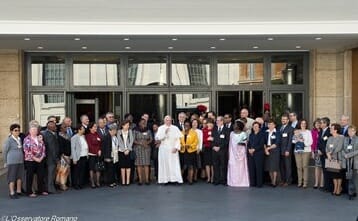 It was a living experience of the Church that was very important for them, a unique experience in their life that they will always carry in their hearts. That is how the family from Colombia described their experience – María Angélica, a dentist, and Luis, Director of the Ethics Department at the University of Gran Colombia, and their two sons of 18 and 20 years. From October 4th to the 25th, they attended the Ordinary Synod on the Family “The vocation and mission of the family in the Church and the contemporary world.” They have been working for families for over 20 years in connection with the Focolare Movement, accompanying couples in the process of preparing for marriage, and for the years that follow when the inevitable crises threaten to deteriorate the sacrament and the love. You had an active role in the work of the small groups. Which moments seemed important to you in making a contribution to the Synod? The experience in the small groups was quite beautiful, because we were able to offer our own experience and that of other families, presenting what we wish to live as a family: the dynamic of love that is lived in the Trinity – in which each of the Three Divine Persons is Love for the other. This is one thing we were able to contribute. Also: emphasising the importance of the Eucharist; we highlighted the need for the presence of Jesus amongst families through mutual love; and so we shared with them about the times we have asked forgiveness of one another when there was not full unity. Another contribution was the point about divorced and remarried couples. It is important to feel a particular love for these families. And that according to the measure in which the experience of faith in them begins to grow – accompanying them to the point that they feel that Jesus is also in their neighbour, in the Word of the Gospel that is meant to be lived, in the community that lives in mutual love – their nearness to Jesus grows. We felt that one important point to be presented to the Synod fathers was Jesus crucified and forsaken, since He took upon Himself the sufferings of humanity. In Him we see the one who was betrayed, humiliated, feeling alone, abandoned, culpable, left without an answer to His question. We are all joined in Him because He lived through all that, and in Him we can have this unique communion wherein all are contained in this yes to Him. This was our proposal: that there is no difference between the family that has not suffered failure and the one that has, because we have all feel accepted by Him. We described the experience of many families, also in the Movement, in which they had said this yes with the pain of not being able to receive the Eucharist, but still knowing that they were called to holiness. Therefore, they are not excluded from the invitation to holiness. As Pope Benedict once remarked: they highlight the beauty of the indissolubility of marriage; they are also builders of this indissolubility, so they make a huge contribution as they grow in this yes.
It was a living experience of the Church that was very important for them, a unique experience in their life that they will always carry in their hearts. That is how the family from Colombia described their experience – María Angélica, a dentist, and Luis, Director of the Ethics Department at the University of Gran Colombia, and their two sons of 18 and 20 years. From October 4th to the 25th, they attended the Ordinary Synod on the Family “The vocation and mission of the family in the Church and the contemporary world.” They have been working for families for over 20 years in connection with the Focolare Movement, accompanying couples in the process of preparing for marriage, and for the years that follow when the inevitable crises threaten to deteriorate the sacrament and the love. You had an active role in the work of the small groups. Which moments seemed important to you in making a contribution to the Synod? The experience in the small groups was quite beautiful, because we were able to offer our own experience and that of other families, presenting what we wish to live as a family: the dynamic of love that is lived in the Trinity – in which each of the Three Divine Persons is Love for the other. This is one thing we were able to contribute. Also: emphasising the importance of the Eucharist; we highlighted the need for the presence of Jesus amongst families through mutual love; and so we shared with them about the times we have asked forgiveness of one another when there was not full unity. Another contribution was the point about divorced and remarried couples. It is important to feel a particular love for these families. And that according to the measure in which the experience of faith in them begins to grow – accompanying them to the point that they feel that Jesus is also in their neighbour, in the Word of the Gospel that is meant to be lived, in the community that lives in mutual love – their nearness to Jesus grows. We felt that one important point to be presented to the Synod fathers was Jesus crucified and forsaken, since He took upon Himself the sufferings of humanity. In Him we see the one who was betrayed, humiliated, feeling alone, abandoned, culpable, left without an answer to His question. We are all joined in Him because He lived through all that, and in Him we can have this unique communion wherein all are contained in this yes to Him. This was our proposal: that there is no difference between the family that has not suffered failure and the one that has, because we have all feel accepted by Him. We described the experience of many families, also in the Movement, in which they had said this yes with the pain of not being able to receive the Eucharist, but still knowing that they were called to holiness. Therefore, they are not excluded from the invitation to holiness. As Pope Benedict once remarked: they highlight the beauty of the indissolubility of marriage; they are also builders of this indissolubility, so they make a huge contribution as they grow in this yes.  At times, it’s a matter of understanding the deep meaning of the sacrament. For many people of our day the sacrament of matrimony doesn’t say much, also because the couple has not been provided with an adequate formation, neither by parish nor ecclesial movement; whereas, it is a part of the journey of every human being to understand how to be human and to discover the transcendent dimension within oneself. It needs to be discovered how this sacrament can help in forming a family and why, through the family, we are responsible for children.” One day, coming out of the small group session, you felt the wish that the bishops would comprehend your deep love for the Church. . . “The relationship and the dialogue with the bishops has been drawing us closer and closer over the past few weeks, closer in knowing one another, listening to one another, also in trying to be ‘mothers’ towards them. For example, if they had a cough, a cold . . . we wished that they would be able to feel that we families also love the Church as they do; that we suffer for the Church as they do; that we also give our life for the Church. We’re on the same journey. As Chiara Lubich once told us: each one of us is like a piece of a mosaic, so our value lies in helping to create the beautiful reality that is the Church. It was very important that this was said – and heard.” One of your own offerings was included in the final document. “Yes, in the final small group meeting the relator asked if we would describe our experience as a family. Then, what was proposed for the final document also contained what each one of us had said. You can’t even tell, really, what was proposed by a family and what was proposed by a Synod father: it was everyone’s proposal, unanimously agreed upon.” What would your wish be for the conclusion of the Synod? “Many best wishes! The hope that, little by little, all families will discover the richness contained in them, no matter what their situation – ‘regular’ or ‘irregular’ – if they live as a real family, to make society better: for the growth of humanity.”
At times, it’s a matter of understanding the deep meaning of the sacrament. For many people of our day the sacrament of matrimony doesn’t say much, also because the couple has not been provided with an adequate formation, neither by parish nor ecclesial movement; whereas, it is a part of the journey of every human being to understand how to be human and to discover the transcendent dimension within oneself. It needs to be discovered how this sacrament can help in forming a family and why, through the family, we are responsible for children.” One day, coming out of the small group session, you felt the wish that the bishops would comprehend your deep love for the Church. . . “The relationship and the dialogue with the bishops has been drawing us closer and closer over the past few weeks, closer in knowing one another, listening to one another, also in trying to be ‘mothers’ towards them. For example, if they had a cough, a cold . . . we wished that they would be able to feel that we families also love the Church as they do; that we suffer for the Church as they do; that we also give our life for the Church. We’re on the same journey. As Chiara Lubich once told us: each one of us is like a piece of a mosaic, so our value lies in helping to create the beautiful reality that is the Church. It was very important that this was said – and heard.” One of your own offerings was included in the final document. “Yes, in the final small group meeting the relator asked if we would describe our experience as a family. Then, what was proposed for the final document also contained what each one of us had said. You can’t even tell, really, what was proposed by a family and what was proposed by a Synod father: it was everyone’s proposal, unanimously agreed upon.” What would your wish be for the conclusion of the Synod? “Many best wishes! The hope that, little by little, all families will discover the richness contained in them, no matter what their situation – ‘regular’ or ‘irregular’ – if they live as a real family, to make society better: for the growth of humanity.”
Safeguard the family with love
“God created the family, and he formed it in this way. He wants there to be love between husband and wife. If love is missing, there’s no marriage, no matrimony. Unfortunately, because of sin, this love has been spoiled to some extent. This love has been clouded over because sin entered humanity. So Jesus came and healed the situation, bringing a stronger love, a greater love, the very love that comes from God, the love which is God himself. So, we must take advantage of what Jesus brought, use this love in order to maintain natural love as well. For example, if you didn’t love your husband any more, you would have to love him because he is Jesus, because he is another Jesus, because you have to be the first to love, because you have to love everyone, because you have to make yourself one, because you have to love him as yourself. In other words, you bring supernatural love into the situation, with all that it means, in order to safeguard human love too. This is what to do and this way of doing things is the foundation of our New Families Movement.” Source: Chiara Lubich Center Video (italian soundtrack) https://vimeo.com/142517715
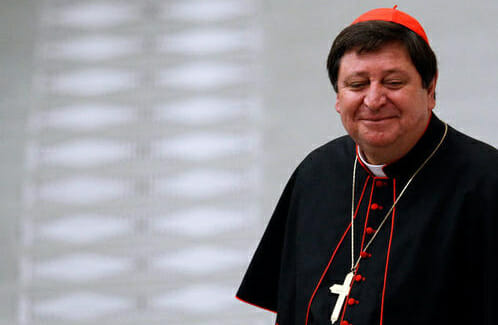
The family: relationships that reflect the Trinity
 “It was the Son of God, Jesus Christ who revealed to us the true image of God and the true image of man and woman. God is Father, Son and Holy Spirit. We are, therefore, not dealing with three gods but one God in three Persons, as lengthily described in the doctrine of the Trinity. The Church has deepened and preserved this doctrine in all its integrity throughout the centuries. Besides finding the correct language in its profession of faith, the Church has always adored the Three Divine Persons. Up to the present, the spiritual Trinitarian doctrine has shown us the deep relationship the disciples of Jesus had with each of these Three Divine Persons. The Word of God does not present God only as a perfect Spirit, creator of heaven and earth, (as declared in the Christian Doctrine’s Second Catechism), but affirms that “God is love” (1 John 4,8.16). Saint Augustine tried to delve deeper into the path of love in God and reached the point of affirming that God is the Lover, the Beloved, and Love itself. However, he felt incapable of pursuing this path and bequeathed to us the deepening of this mystery in man and woman, in the three qualities of intelligence, memory and will. But what remained to be fully developed was the deeper understanding of the mystery of God who is Love. In our time, in which culture affirms the individual up to the point of falling into an exasperated individualism, and we struggle to make the synthesis between unity and diversity in the human relationships in this globalised world where human relationships are still re-evaluated in all senses, it would be opportune to seek in the Holy Trinity, that essentially Christian foundation, the path towards the fulfillment of love as a human identity. What is love? How can we understand and experience love? Our pathway must be found in the pathway of He who came to us from the womb of the Father, that is, the Son. To meet man, God who is love made himself nothing (Nazareth, Maria, Joseph, Bethlehem, the flight to Egypt. The Cross) (cfr text of Paul to the Philppians 2,5-11). Love passes through the incarnation and the mystery of the resurrection. Love makes itself nothing to be able to meet the other. This is the Kenotic dimension of love. Without this path it would be difficult for man and woman to find that relationship with God, but also with each other, whether man or woman. In this sense I think we could find the Trinitarian path of anthropology, not only theoretically but concretely.”
“It was the Son of God, Jesus Christ who revealed to us the true image of God and the true image of man and woman. God is Father, Son and Holy Spirit. We are, therefore, not dealing with three gods but one God in three Persons, as lengthily described in the doctrine of the Trinity. The Church has deepened and preserved this doctrine in all its integrity throughout the centuries. Besides finding the correct language in its profession of faith, the Church has always adored the Three Divine Persons. Up to the present, the spiritual Trinitarian doctrine has shown us the deep relationship the disciples of Jesus had with each of these Three Divine Persons. The Word of God does not present God only as a perfect Spirit, creator of heaven and earth, (as declared in the Christian Doctrine’s Second Catechism), but affirms that “God is love” (1 John 4,8.16). Saint Augustine tried to delve deeper into the path of love in God and reached the point of affirming that God is the Lover, the Beloved, and Love itself. However, he felt incapable of pursuing this path and bequeathed to us the deepening of this mystery in man and woman, in the three qualities of intelligence, memory and will. But what remained to be fully developed was the deeper understanding of the mystery of God who is Love. In our time, in which culture affirms the individual up to the point of falling into an exasperated individualism, and we struggle to make the synthesis between unity and diversity in the human relationships in this globalised world where human relationships are still re-evaluated in all senses, it would be opportune to seek in the Holy Trinity, that essentially Christian foundation, the path towards the fulfillment of love as a human identity. What is love? How can we understand and experience love? Our pathway must be found in the pathway of He who came to us from the womb of the Father, that is, the Son. To meet man, God who is love made himself nothing (Nazareth, Maria, Joseph, Bethlehem, the flight to Egypt. The Cross) (cfr text of Paul to the Philppians 2,5-11). Love passes through the incarnation and the mystery of the resurrection. Love makes itself nothing to be able to meet the other. This is the Kenotic dimension of love. Without this path it would be difficult for man and woman to find that relationship with God, but also with each other, whether man or woman. In this sense I think we could find the Trinitarian path of anthropology, not only theoretically but concretely.”

Building peace!
 “We also felt the need to do something for all the poor families in our city. And we discovered that here in Teramo (Italy), the Caritas association runs an emporium where they collect basic goods for those in need. And so, with our parents, we visited this emporium and having discovered – to our great joy – that some bakers in the city donate not only the leftovers but also fresh bread, we decided to take eggs, jam, toilet paper, and refreshing tissues (since, as they said, they work like water). We filled up three trolleys with gifts!!! We all, kids and adults were all very happy, because we discovered a way of helping people who have nothing to eat. Now that we know about this special supermarket, we shall return and try to involve all our friends.” (The gen4 and gen3 boys and girls of Teramo, Italy)
“We also felt the need to do something for all the poor families in our city. And we discovered that here in Teramo (Italy), the Caritas association runs an emporium where they collect basic goods for those in need. And so, with our parents, we visited this emporium and having discovered – to our great joy – that some bakers in the city donate not only the leftovers but also fresh bread, we decided to take eggs, jam, toilet paper, and refreshing tissues (since, as they said, they work like water). We filled up three trolleys with gifts!!! We all, kids and adults were all very happy, because we discovered a way of helping people who have nothing to eat. Now that we know about this special supermarket, we shall return and try to involve all our friends.” (The gen4 and gen3 boys and girls of Teramo, Italy)

